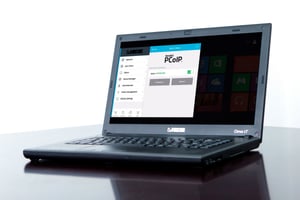NCS VDI Delivers Security & Convenience to Workforce Disrupted by Covid-19
For more than five years, IT managers have come to depend on NCS Technologies to deliver zero client VDI solutions that are extremely secure, cost effective and easy to use and administer. IT challenges such as maintaining strong security policies are now even more important as the nation shifts to Work From Home (WFH), and devices are exposed in the home environment. 
NCS is one of the leading suppliers of virtual desktop technologies to the government, military and commercial markets such as healthcare and retail. In normal times, our desktop and laptop solutions are prized for their strong security and effortless mobility and portability. As the nation avoids workplaces to socially distance and more effectively fight the spread of the novel coronavirus, NCS devices powered by Teradici software can help IT managers maintain security and save money.
From an IT manager's perspective, if a company's dispersed workers are using regular PCs from home, will the company be protected from security breaches and can all those devices be effectively managed?
IT Managers Beware! Regular PCs and Thin Clients Used at Home ... Yikes!
IT managers realize that regular work PCs used in the home are highly vulnerable to security breaches. This is because the PCs may be used by family members. In addition, a worker may not follow corporate security policies as diligently for browsing and downloads when working from the home environment. It's human nature.
To get around this, the IT manager may issue thin clients for home use. Thin clients are perceived to be more secure than traditional PCs.
NCS believes that the thin client environment is not for everyone, particularly where security and manageability are high priorities. It is assumed that with the thin client the OS, applications and sensitive data are hosted and centrally managed in the data center. But this is not so. A thin client retains a small capacity hard drive, some local memory and an embedded OS. This implementation still requires some IT administration and is vulnerable to security exploitation.
Why NCS Zero Clients Should Be Part of the Virtualization Mix
For many administrators, a zero client installation may be the better choice. NCS Zero Clients today are managed by VMware Horizon software and use the ultra-secure Teradici PCoIP remote display protocol.
NCS Zero Clients have no local OS. The operating system resides in the data center. Therefore, there is no persistent user data, no patches, updates or antivirus software needed. Of the many ways to virtualize at the endpoint, zero clients are proving to be the most effective, "no drama" solution.
More About PCoIP
PCoIP is a high performance computer display protocol used in endpoint VDI. PCoIP from Teradici uses advanced compression to provide end users with rich content from the cloud or data center. PCoIP securely delivers applications or workspaces to the endpoint by compressing and encrypting pixels. More than 10 million VDI endpoints use PCoIP. NCS partners with Teradici for desktop virtualization.
To manage virtualized endpoints, NCS recommends the Teradici All Access Plan.
Teradici All Access Licensing Plan
Teradici's licensing plan enables the lowering of IT costs and reduction of admin time. Existing applications are easily migrated as needed.
All Access allows the IT manager to manage, optimize and future proof any data center and zero client deployment. Datacenter elements and end points are always up to date, managed efficiently and supported by Teradici. Teradici All Access subscribers get exclusive access to cloud access software, PCoIP Management Console Enterprise, firmware upgrades, resources and support.
The NCS VDI Portfolio
The NCS portfolio includes:
* Zero Client Desktops With Dual Display - Cirrus TZ-202L & Cirrus DT 5220
* Zero Client Desktops With Quad Display - Cirrus TZ-204L
* WiFi Zero Client Desktops with Dual Display - Cirrus DT WiFi & Cirrus DT 5230
* Zero Client Laptop - Cirrus LT Plus
Download this brochure to learn more about NCS virtualization solutions.


